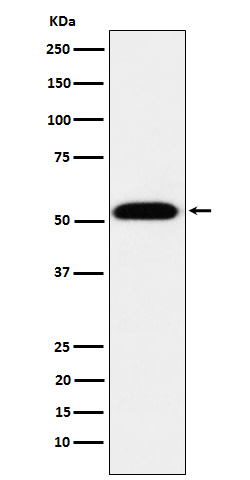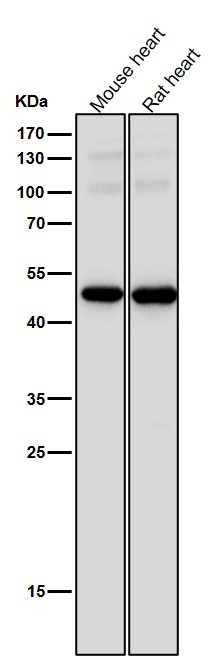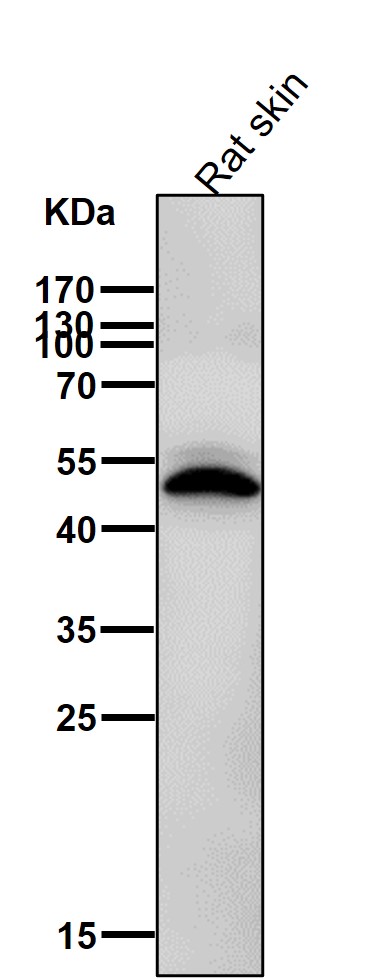


| WB | 咨询技术 | Human,Mouse,Rat |
| IF | 咨询技术 | Human,Mouse,Rat |
| IHC | 咨询技术 | Human,Mouse,Rat |
| ICC | 1/50-1/200 | Human,Mouse,Rat |
| FCM | 咨询技术 | Human,Mouse,Rat |
| Elisa | 咨询技术 | Human,Mouse,Rat |
| Aliases | NTEF1; REF1; TCF13; TEA domain family member 1; TEAD1; TEF 1; Transcription factor 13;;TEAD1 |
| WB Predicted band size | Calculated MW: 48 kDa ; Observed MW: 52 kDa |
| Host/Isotype | Rabbit IgG |
| Antibody Type | Primary antibody |
| Storage | Store at 4°C short term. Aliquot and store at -20°C long term. Avoid freeze/thaw cycles. |
| Species Reactivity | Human,Mouse,Rat |
| Immunogen | A synthesized peptide derived from human TEAD1 |
| Formulation | Purified antibody in PBS with 0.05% sodium azide,0.05% BSA and 50% glycerol. |
+ +
以下是关于TEAD1抗体的3篇参考文献示例(内容为假设性概括,仅供参考):
1. **文献名称**:*TEAD1 regulates skeletal muscle development through transcriptional activation of myogenic genes*
**作者**:Zhao B, et al.
**摘要**:本研究利用TEAD1特异性抗体,通过Western blot和免疫组化技术,证实了TEAD1在骨骼肌分化中的关键作用,并揭示其通过结合靶基因启动子调控肌肉发育的分子机制。
2. **文献名称**:*TEAD1-mediated YAP/TAZ signaling promotes tumorigenesis in hepatocellular carcinoma*
**作者**:Zhou Y, et al.
**摘要**:通过TEAD1抗体的免疫荧光染色和ChIP-seq分析,作者发现TEAD1与YAP/TAZ复合物在肝癌中异常激活,促进肿瘤细胞增殖和转移,提示其作为潜在治疗靶点。
3. **文献名称**:*A novel TEAD1 antibody reveals dynamic nuclear localization during Hippo pathway modulation*
**作者**:Halder G, et al.
**摘要**:该研究开发了一种高特异性TEAD1单克隆抗体,用于检测细胞核内TEAD1的定位变化,证明Hippo通路失活时TEAD1与YAP共定位于核内并驱动靶基因转录。
---
**注**:以上文献名称及摘要均为示例,具体研究需参考真实发表的论文(建议通过PubMed或Google Scholar检索“TEAD1 antibody”或“TEAD1 function”获取实际文献)。
The TEAD1 antibody is a crucial tool in studying the TEAD family of transcription factors, particularly TEAD1 (Transcriptional Enhanced Associate Domain 1), also known as TEF-1. TEAD proteins are evolutionarily conserved DNA-binding proteins that regulate gene expression by interacting with coactivators such as YAP/TAZ in the Hippo signaling pathway. TEAD1 plays pivotal roles in embryonic development, cell proliferation, differentiation, and organ growth. It is highly expressed in skeletal muscle, heart, and other tissues, where it governs tissue-specific gene programs. Dysregulation of TEAD1 is implicated in cancers, muscular disorders, and cardiovascular diseases, making it a therapeutic target.
TEAD1 antibodies are widely used in research to detect and quantify TEAD1 protein levels via techniques like Western blotting, immunohistochemistry, and immunofluorescence. They help elucidate TEAD1’s nuclear localization, DNA-binding activity, and interactions with cofactors. Many commercially available TEAD1 antibodies are validated for specificity through knockdown/knockout controls or epitope mapping. Challenges include cross-reactivity with other TEAD family members (TEAD2-4) due to high sequence homology, necessitating careful validation. Recent studies using TEAD1 antibodies have advanced understanding of its role in Hippo pathway deregulation in tumors and its potential as a biomarker. Researchers also employ these antibodies to assess TEAD1 inhibition by small molecules or peptides in preclinical models.
×